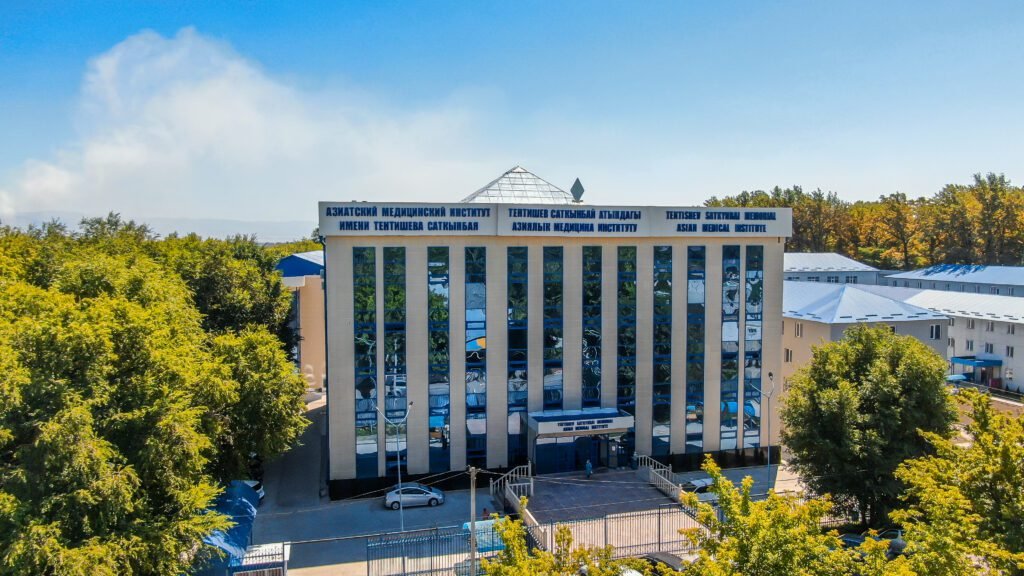Asian Medical Institute, Kyrgyzstan
About Asian Medical Institute, Kyrgyzstan

Image Source: https://kyrgyzstatemedicalacademy.net
Overview
| Accepted Examination | NEET Qualification |
| Total Course Fees | $25,000/- (Approx) |
| University Ranking | – |
| Course Duration | 5 years + 1-year internship |
| Medium of Instruction | English |
| Recognition & Accreditation | NMC, WHO , AMEE , ECFMG , FAIMER, FPME |
| Location | Kant, Kyrgyzstan |
Why Study MBBS in Asian Medical Institute, Kyrgyzstan?
- Quality Education: Education of the highest calibre is provided at this institutuion, particularly in the area of medicine. The university ensures students obtain the skills and information essential to flourish in their medical careers by following a thorough curriculum and offering hands-on training.
- Internationally Recognised and Acknowledged Degree: The Medical Council of India (MCI) and the World Health Organisation (WHO) both recognise and acknowledge the MBBS degree earned from this institution.
- Experienced Faculty: Professors, doctors, and researchers who are authorities in their disciplines make up highly qualified and experienced faculty. Students receive helpful advice, mentorship, and support from the faculty members throughout their academic careers.
English-Medium Programs: English-medium programmes are available at the university, making it simpler for overseas students to study and interact efficiently. These programmes include MBBS. Since English is the primary language of instruction, this language barrier is removed, allowing students to concentrate on their studies without being distracted by language issues.
Affordable Tuition: The tuition costs for studying MBBS are relatively low when compared to those in many other nations. This makes it a desirable choice for students looking for a high-quality education at an affordable price.
Modern Facilities: It offers state-of-the-art facilities, including well-stocked labs, contemporary lecture halls, libraries, and cutting-edge medical technology. These tools support practical education and guarantee that students get first-hand experience in their chosen sector.
Clinical Exposure: The university has partnerships with prestigious hospitals and medical institutions, giving students many possibilities for clinical exposure and hands-on instruction. Their practical abilities are improved by this experience, which also gives students the chance to talk to patients and get ready for actual medical emergencies.
Multicultural Setting: The institution fosters a multicultural setting on campus by welcoming students from different nations. This diversity prepares students to work in a variety of healthcare settings by fostering cultural interchange and understanding and broadening their viewpoints.
Safe and Friendly Environment: Kyrgyzstan is well-known for its safe and friendly atmosphere for foreign students. The institution takes precautions to guarantee the security and wellbeing of its students and offers a welcoming environment that is conducive to learning.
- Opportunities for Postgraduate Study: It provides a range of postgraduate medical programmes that let students continue their studies and focus on particular medical specialties. For students who want to pursue higher education and develop their medical professions, the university offers a smooth transfer.
Benefits of MBBS in Asian Medical Institute, Kyrgyzstan
- Quality and Affordable Education
- No Donation or Headcount
- Recognized and Valid Medical Degrees
- Qualified Faculties
- Comfortable Weather Conditions
- Peace and safe Environment
- Exposure & Recognition Around the World
- Easy Admissions Procedure
- No Entrance Fee or Covert Charges
- Cost-effective Fee Structure
Eligibility Criteria
✓ Candidates must be at least 17 years old to be considered for admission.
✓ Requirements must be full fill listed in the guidelines of NMC
✓ Must have Qualified in NEET Exam
✓ Valid Passport with a minimum validity of 6 months – 1 Year
✓The applicant must successfully complete the 10+2 standard from a reputable board with at least a 70% overall score in the fields of biology, physics, and chemistry.
Documents required
For successful admission for the MBBS programme candidate must present the following supporting documentation:
- Class 10th Marksheet
- Class 12th Marksheet
- NEET scorecard
- Original Passport
- Photo Copy
- Original PCC
Course Duration
The MBBS programme at the University in Kyrgyzstan normally lasts five years. Students receive thorough instruction in a variety of medical specialties, including anatomy, physiology, biochemistry, pathology, pharmacology, and clinical topics, during the course of these five years. The university has a carefully planned curriculum that gives students the knowledge and abilities they need to become qualified medical professionals. The course of study consists of academic lectures, hands-on training, clinical rotations, and practical experience in hospitals and healthcare facilities. Students who successfully complete the five-year MBBS programme are given an internationally recognised degree that enables them to seek further specialisation or practise medicine in different nations.
Fee Structure
| Particular | Year 1 | Year 2 | Year 3 | Year 4 | Year 5 |
| Tuition Fee | $ 5400 | $ 3500 | $ 3500 | $ 3500 | $ 3500 |
- $1 = Rs.80 (for calculation purposes.)
MBBS Syllabus
1st Semester:
- Kyrgyz language
- Kyrgyz literature
- Foreign language
- Normal physiology
- Latin language
- Mathematics
- Histology, cytology, embryology
- Normal anatomy
- Russian language
- Physical education and sports
- Chemistry
- Medical biology
2nd Semester:
- Biochemistry
- Normal physiology
- Normal anatomy
- Manas study
- Kyrgyz language
- Kyrgyz literature
- Histology
- Russian language
- Medical Biophysics
- Philosophy
- Physical education and sports
3rd Semester:
- Geography of Kyrgyzstan
- History of Kyrgyzstan
- History of medicine
- Nanotechnology in medicine
- Microbiology, Virology and Immunology
- Pathological anatomy
- Pathological physiology
- Psychology
- Introduction to Clinical Medicine
- Microbiological diagnosis of nosocomial Infections
4th Semester:
- Urinary system
- Respiratory system
- Digestive system
- Blood system
- Musculoskeletal system
- Patient Care
5th Semester:
- Basic pharmacology
- General hygiene
- Fundamentals of specific surgical infections
- Propaedeutic surgery
- Psychohygiene
- Endocrine system
- Dentistry
- Epidemiology
- Cardiovascular system
- Syndrom of hypophysis dysfunction
- Nervous system
6th Semester:
- Valeology
- Dermatovenerology
- Age physiology and pathology
- General hygiene
- Operative surgery
- Otorhinolaryngology
- Ophthalmology
- Pathological anatomy
- Rare dermatoses
- Cardiovascular diseases
- Rare hemispheric syndromes
- Respiratory diseases
- Diseases of the gastrointestinal tract
- Diseases of the urinary system
7th Semester:
- Professional diseases
- Medical Genetics
- Internal diseases
- Children’s diseases
- Surgical diseases
- Pediatric Surgery
- Operative Surgery
- Obstetrics and gynecology
- Elective subjects
- Neurology with the basics of neurosurgery
8th Semester:
- Obstetrics and gynecology
- Surgery
- Clinical Pharmacology
- Pediatrics
- Oncology
- Radiation therapy
- Urology
- Therapy
- Traumatology and orthopedics, children’s trauma
9th Semester:
- Infectious diseases
- Public health and healthcare
- Family medicine
- Tropical Medicine
- Psychiatry and narcology
- Epidemiology
- Phthisiology
- Children’s infectious diseases
10th Semester:
- Traumatology and orthopedics, children’s trauma
- Interdisciplinary comprehensive state examination
- Obstetrics and Gynecology
- Interdisciplinary Comprehensive State Exam: Pediatrics
- Anesthesiology, intensive care, emergency conditions
- Evidence medicine
- Interdisciplinary comprehensive State examination: Surgery
- General physiotherapy
FAQ
MBBS abroad is a better options then private medical in India, especially in terms of cost, private medical in India costs a fortune more then that of many countries abroad.
Expertise: Rare Education have years of experience and in-depth knowledge about the admission process, eligibility criteria, fees, and other requirements for pursuing MBBS abroad. We can guide you through the entire process and help you avoid common mistakes and pitfalls.
Time-saving: The admission process for MBBS abroad can be complex and time-consuming. Working with Rare Education can help save a significant amount of time as we can handle all the paperwork and follow-up for you.
Access to information: Rare Education have access to a wide range of information about various medical schools, their fees, and programs. We can help you compare and choose the best options based on your needs and budget.
Professional guidance: Rare Education can provide professional guidance on the best country and medical school to choose based on your academic background, personal interests, and career goals. We can also help you with the visa process, travel arrangements, and settling into your new surroundings.
Support throughout the Process: Rare Education provide ongoing support throughout the entire admission process and beyond. We can answer any questions you have, provide updates on your application status, and help resolve any issues that may arise.
Working with Rare Education for MBBS abroad admission can provide numerous benefits, including expertise, time-saving, access to information, professional guidance, and support throughout the process.
Comparing FMG exam with NEET, we can safely say it is not at all a tough exam. Although there are no specific matrix to judge how tough an exam is, but considering the passing ratio of FMG exam which is roughly 20-25% to that of the percentage of candidates who get selected for government medical college through NEET which is roughly 0.02%, FMG exam is definitely a tough exam in the field of medical studies.

